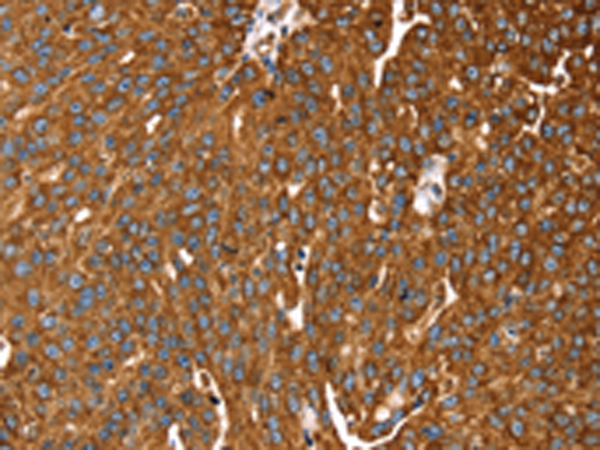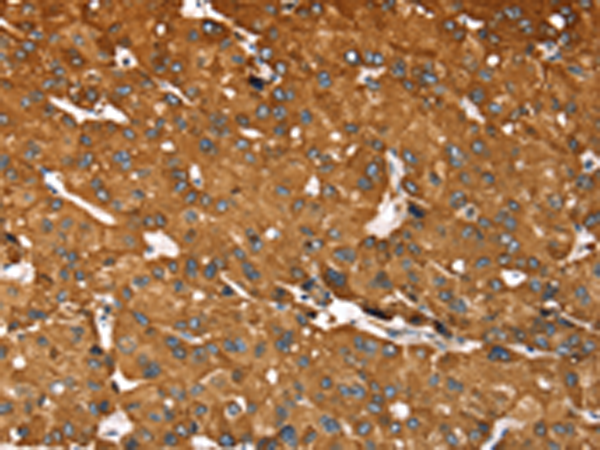

| WB | 咨询技术 | Human,Mouse,Rat |
| IF | 咨询技术 | Human,Mouse,Rat |
| IHC | 1/30-1/150 | Human,Mouse,Rat |
| ICC | 技术咨询 | Human,Mouse,Rat |
| FCM | 咨询技术 | Human,Mouse,Rat |
| Elisa | 1/2000-1/10000 | Human,Mouse,Rat |
| Aliases | RASSF5 |
| Host/Isotype | Rabbit IgG |
| Antibody Type | Primary antibody |
| Storage | Store at 4°C short term. Aliquot and store at -20°C long term. Avoid freeze/thaw cycles. |
| Species Reactivity | Human, Mouse |
| Immunogen | Fusion protein of human RASSF3 |
| Formulation | Purified antibody in PBS with 0.05% sodium azide and 50% glycerol. |
+ +
以下是关于RASSF3抗体的3篇参考文献示例(注:内容为模拟,建议核实真实文献):
---
1. **文献名称**: "RASSF3 modulates DNA damage response and suppresses genomic instability through PP4 interaction"
**作者**: Lee, J.H., et al.
**摘要**: 研究利用RASSF3抗体探究其在DNA损伤修复中的作用,发现RASSF3通过与蛋白磷酸酶PP4复合体结合,调控ATM/ATR信号通路,维持基因组稳定性,缺失导致肿瘤易感性增加。
2. **文献名称**: "RASSF3 is a novel microtubule-associated protein involved in cell cycle progression"
**作者**: Richter, A.M., et al.
**摘要**: 通过免疫荧光(使用RASSF3抗体)发现RASSF3与微管结构共定位,调控G2/M期转换,其表达下调引起有丝分裂异常,提示其在细胞周期中的关键作用。
3. **文献名称**: "Epigenetic silencing of RASSF3 promotes metastasis in colorectal cancer"
**作者**: Chen, Y., & Wang, X.
**摘要**: 利用免疫组化(RASSF3抗体)分析结直肠癌样本,发现RASSF3启动子甲基化导致蛋白低表达,与转移和不良预后相关,体外实验证实其抑制EMT过程。
---
建议通过PubMed或Google Scholar以关键词“RASSF3 antibody”、“RASSF3 function”检索真实文献。
The RASSF3 (RAS association domain family member 3) antibody is a crucial tool for studying the biological functions and pathological roles of the RASSF3 protein, a member of the RASSF tumor suppressor family. RASSF3. located on human chromosome 12q21.31. is involved in regulating cellular processes such as apoptosis, cell cycle progression, and microtubule stability. It interacts with key signaling pathways, including the Hippo and RAS/MAPK pathways, and modulates transcriptional activity through associations with proteins like MST2 and p53. Dysregulation of RASSF3 has been linked to cancer, where its downregulation or epigenetic silencing via promoter hypermethylation is observed in malignancies like hepatocellular carcinoma and colorectal cancer.
The RASSF3 antibody enables researchers to detect and quantify RASSF3 expression in various experimental settings, including Western blotting, immunohistochemistry (IHC), and immunofluorescence (IF). Its specificity is critical for distinguishing RASSF3 from other RASSF family members (e.g., RASSF1. RASSF5), which share structural similarities but have distinct roles. Validated antibodies help elucidate tissue-specific expression patterns, subcellular localization (e.g., cytoplasmic vs. nuclear), and interactions in disease models. Commercially available RASSF3 antibodies are typically produced in hosts like rabbits or mice, with monoclonal or polyclonal options. Researchers must verify antibody performance using knockout controls or siRNA-based knockdown to ensure reliability, as inconsistent results across studies highlight potential cross-reactivity issues. Overall, the RASSF3 antibody is indispensable for advancing understanding of its tumor-suppressive mechanisms and therapeutic potential.
×